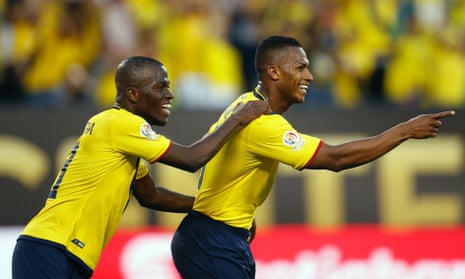Ecuador is one of the two South American nations that never won a Copa América. But when the US face the Ecuadoarians in the quarter-finals in Seattle on Thursday, they’ll be taking on one of the fastest developing and strongest teams in Conmebol, currently leading the continental qualifiers for Russia 2018 with 13 points from six games – the same as Uruguay. Ecuador’s growth can be compared to Colombia’s rise in the 1990s, and they’re a team that have put the likes of Argentina and Brazil on their knees with a mix of physical prowess and flair.
But speaking of Ecuador’s renaissance also requires taking a look at its darkest hour, less than three years ago. On 29 July 2013, the country’s biggest star, 27-year-old Cristian “Chucho” Benitez, died of a respiratory arrest in Doha, Qatar, the country where he had recently moved to play for El Jaish. A month after playing his last game for his country, against Peru in Lima, Benitez’s body returned home in a casket. His death shook the nation and left the squad into shock. Hundreds of thousands attended his funeral, including Ecuador’s president Rafael Correa. Benitez was not only one of the most talented players of his generation, but also the most charismatic, on and off the pitch.
“It was hard to rebuild the squad without Chucho, but one of the first measures was to name as captain Antonio Valencia, who was nearly a brother, as a gesture of friendship that eventually united us all,” said former manager Reinaldo Rueda. Having recently tattooed Benitez’s name on his arm, Valencia led Ecuador to an unexpected qualification to Brazil 2014. Every match ended in tears from fans and players alike. Every goal, every victory, was dedicated to Chucho. No-one thought qualification was possible. But it happened.
Benitez’s No11 jersey was retired for life, although Fifa insisted Ecuador reinstate a No11 on their World Cup roster. Felipe Caicedo, formerly of Manchester City, had the honour of paying homage to his friend in Brazil. In this Copa America the privilege went to Michael Arroyo, who also inherited Benitez’s No11 jersey at Mexico giants Club América.
So what can USA expect on Thursday?
“Ecuadorians always had good technique, but they never had a professional squad such as this. It’s the best in their history”, said Diego Maradona after Ecuador qualified for the World Cup. And the arrival of manager Gustavo Quinteros, right after winning two consecutive trophies for Emelec, helped to cement a new style.
If Ecuador had suffered from something in the past, it was the lack of consistency. They were usually good at home, but had problems every time they played away. And some attractive displays of nice football and attacking quality were followed by naive distractions in the back.
“We are now prepared to play 90 minutes with the same style, regardless of the circumstances. The last campaign we managed to qualify thanks to our home records; now we must get points away too,” admitted Quinteros after Ecuador beat Argentina 2-0 in Buenos Aires in their first qualifying match for Russia in October. It was Argentina’s first home defeat since 1993, when they had succumbed to Colombia’s golden generation in a historic 5-0, and the first time an Ecuadorian side had won in Buenos Aires for 74 years.
Rather than holding to the traditional 4-3-3, Ecuador now relies on a solid 4-4-2 that can easily be transformed into a 4-2-3-1, thanks to Miller Bolaños retreating in midfield if necessary. In any case, with the absence of a true No10, speedy wingers Antonio Valencia and Jefferson Montero are vital – rather than the usual holding style, much of Ecuador’s build-up starts directly on the wings. “We have players with good technique, but we try to move forward as quickly as possible, without losing time,” explained Quinteros.
Perhaps Ecuador’s biggest improvement has taken place in defence, thanks to a solid duo of centre-backs: the 25-year-old Arturo Mina, a revelation for his club Independiente del Valle, current semi-finalists of Copa Libertadores, and the experienced Gabriel Achilier, Emelec’s team leader. But it’s thanks to the two holding midfielders, Christian Noboa and Carlos Gruezo, that Ecuador are rarely caught out. They mesh well with the full-backs, Juan Carlos Paredes and Walter Ayovi, forming a six-man defensive line that is difficult to break down.
“The key is to be solid in defence without losing power in attack. I’m quite happy with the defensive performances – not every team can play Brazil the way we did. Had it not been for the assistant referee that disallowed the valid goal we’d scored, we should be speaking of the first time that Ecuador beat Brazil in their history, months after beating Argentina for the first time, too,” said Quinteros last week. (Bolanos’s effort was ruled out in controversial circumstances.) Born in Argentina, Quinteros was a centre-back that successfully played for Bolivia, leading them to a historic 1994 World Cup qualification.
Order, discipline and counter-attack – three forbidden terms for managers favouring sexy football – are now part of Ecuador’s lexicon. Just as Chile developed an own style with Marcelo Bielsa and Jorge Sampaoli, Ecuador is now relying on its own – not taking unnecessary risks without losing the flair of its forwards. It’s working well: they secured a 0-0 draw against Brazil in their opener, fought back to draw 2-2 with Peru, and then thumped Haiti 4-0 to reach the last eight.
The team that felt overwhelmed by the loss of its biggest star discovered that there was light at the end of the tunnel. Chucho Benitez is still the biggest inspiration, but the rest is neither a miracle nor a fairytale – just hard work.

Comments (…)
Sign in or create your Guardian account to join the discussion